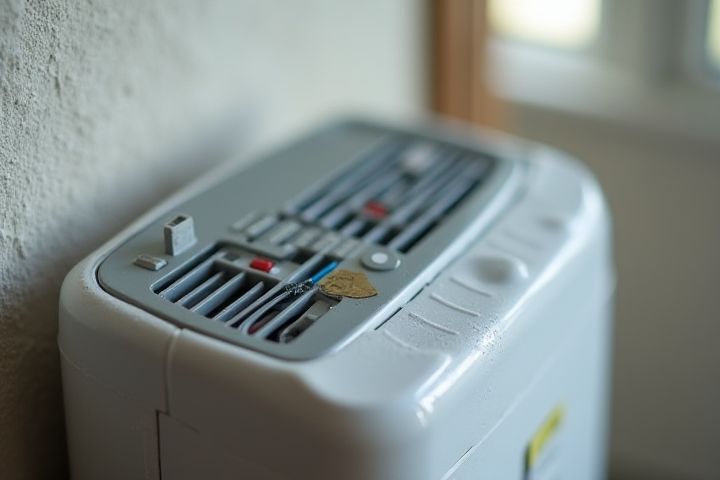
A dehumidifier is essential for your home to maintain optimal indoor air quality by reducing excessive humidity levels. High humidity can lead to mold growth, which poses health risks and damages walls, furniture, and other belongings. Moreover, excessive moisture can create an uncomfortable environment, making it difficult to relax or focus. Using a dehumidifier can help protect your respiratory health by minimizing allergens and irritants like dust mites and mildew. Choosing the right size and type of dehumidifier ensures effective moisture control tailored to your living space.
Why Does My House Need A Dehumidifier
Mold prevention
A dehumidifier is essential for mold prevention, as it helps maintain indoor humidity levels between 30% and 50%. This range creates an inhospitable environment for mold spores, which thrive in damp conditions. Each year, homes with high humidity levels can foster mold growth, leading to potential health risks, such as respiratory issues and allergies. Investing in a dehumidifier can protect not only your living space but also your family's well-being by minimizing mold-related health hazards.
Allergy relief
A dehumidifier effectively reduces indoor humidity levels, creating an environment less conducive to allergens such as mold, dust mites, and mildew. Lower humidity can significantly alleviate allergy symptoms, as many individuals are sensitive to these airborne irritants. By maintaining optimal humidity levels between 30% and 50%, your home can diminish the proliferation of allergens, leading to improved air quality and respiratory health. Investing in a dehumidifier can be a crucial step in managing allergies, ensuring a cleaner and more comfortable living space.
Structural integrity
Excess humidity levels, typically exceeding 50%, in your home can lead to significant structural damage over time. This moisture fosters mold growth, which can compromise wooden beams and drywall, resulting in costly repairs. Additionally, high humidity can contribute to rust and corrosion on metal components, weakening the overall framework of your house. Investing in a dehumidifier helps maintain optimal humidity levels, preserving the structural integrity and longevity of your home.
Improved air quality
A dehumidifier significantly enhances your home's air quality by reducing excess moisture in the air, which can foster the growth of mold, mildew, and dust mites. High humidity levels often lead to musty odors and can exacerbate allergies and asthma symptoms. By maintaining optimal humidity levels between 30% and 50%, a dehumidifier helps create a healthier indoor environment, promoting comfort and well-being for you and your family. Furthermore, improved air quality can lead to better sleep and increased productivity, making your living space more enjoyable overall.
Pest control
High humidity levels in your home can create an ideal environment for pests such as termites, cockroaches, and mold. Maintaining indoor humidity between 30% and 50% is crucial for pest control, as excessive moisture fosters breeding and survival. A dehumidifier can effectively reduce humidity levels, making your home less attractive to these unwanted visitors. Investing in a dehumidifier not only improves air quality but also protects your property from structural damage caused by pests.
Odor reduction
A dehumidifier plays a vital role in odor reduction by controlling humidity levels in your home, which discourages the growth of mold and mildew--common sources of musty smells. Excess moisture creates an environment where bacteria thrive, leading to unpleasant odors. By maintaining an optimal humidity level, typically between 30-50%, a dehumidifier helps eliminate these odors, ensuring a fresher living space. Installing a dehumidifier not only contributes to a more pleasant atmosphere but also enhances the overall air quality in your home.
Comfort enhancement
A dehumidifier enhances comfort in your home by maintaining optimal humidity levels, typically between 30% and 50%. High humidity can lead to a feeling of heaviness and stickiness, making indoor spaces uncomfortable, especially during warmer months. By reducing excess moisture, a dehumidifier can help prevent mold growth and dust mites, which contribute to allergies and respiratory issues, further improving your overall living environment. Investing in a dehumidifier provides not only physical comfort but also promotes better air quality, ensuring a healthier space for you and your family.
Energy efficiency
A dehumidifier significantly enhances energy efficiency by maintaining optimal humidity levels, which allows your HVAC system to operate more effectively. High humidity can cause your air conditioning unit to work harder, leading to increased energy consumption and higher utility bills. By controlling moisture, a dehumidifier helps your home feel cooler, enabling you to set your thermostat at a higher temperature without sacrificing comfort. Consequently, investing in a dehumidifier not only promotes a healthier indoor environment but also contributes to long-term savings on energy costs.
Preservation of belongings
A dehumidifier is essential for preserving belongings in your home by maintaining optimal humidity levels between 30% and 50%. High humidity can lead to mold growth, which can damage furniture, clothing, and valuable items, potentially costing you thousands in repairs or replacements. Additionally, excess moisture can warp wooden structures and instigate rust on metal appliances. Investing in a quality dehumidifier can protect your personal belongings, ensuring they remain in excellent condition over time.
Health benefits
Excess humidity levels in your home can lead to mold growth, which negatively affects indoor air quality and can trigger respiratory issues, allergies, and asthma attacks in sensitive individuals. A dehumidifier helps maintain optimal humidity levels, ideally between 30% and 50%, reducing the risk of mold and dust mites that thrive in damp conditions. By lowering humidity, a dehumidifier also contributes to preventing the growth of harmful bacteria and improves overall comfort, promoting better sleep and well-being. Regular use can significantly enhance air quality, helping you breathe easier and live healthier in your home environment.
